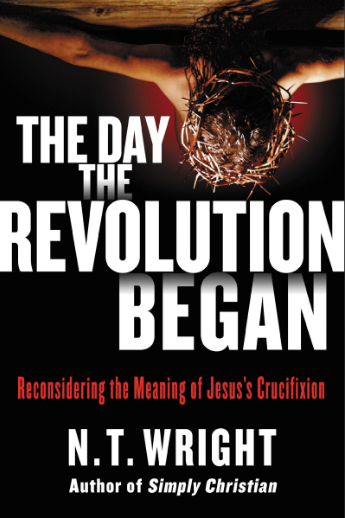
I am predicting that N.T. Wright’s newest, The Day the Revolution Began, will become more significant than his justly and widely-read Surprised by Hope. Wright has taken the tradition of Christian atonement theories back to the Bible to challenge the theories and to reframe the whole discussion — not by way of rejecting that Jesus has died for our sins but by way of putting it all into his larger understanding of the Bible’s own narrative. E.g., end of exile, kingdom of God on earth as it is in heaven, new heavens and new earth, and not going off to some surreal heaven when we die.
One glaring weakness Wright observes with fierce clarity — that most atonement theories both build on one another in a kind of inner-dogmatic history discussion and at the same time ignore what Jesus said and did about atonement. Here are his important words:
Right away we meet something very peculiar. You might suppose that if Christian theologians were going to trace the meaning of Jesus’s death, they would begin with Jesus himself. Mostly, they do not. I possess many books on the “atonement.” Few give much attention to the gospels. None, as far as I recall, starts with Jesus himself. [Ahem, sir.] They may sooner or later highlight one famous saying, Mark 10:45 (“The son of man . . . came to be the servant, to give his life ‘as a ransom for many’”), but they do not normally go much beyond that. They seldom if ever link the meaning of Jesus’s death with Jesus’s announcement of God’s kingdom coming “on earth as in heaven.” They seldom highlight the fact that Jesus chose to go to Jerusalem and (so it seems) force some kind of a showdown with the authorities not on the Day of Atonement, not at the Festival of Tabernacles, the Festival of Dedication, or any other special day on the sacred calendar, laden with meaning as they were, but at Passover (170).
(These very points prompted my Jesus and His Death as well as A Community called Atonement and, if you’d like the newest version of this discussion at the academic level, read the exceptional and brand spanking new book by Brant Pitre, Jesus and the Last Supper. Both of us focus on Jesus and the Passover.)
Wright develops a point often ignored: on its own, good Friday meant nothing. “The first thing to realize is that the crucifixion, by itself, carried no “meaning” whatever other than the depressingly normal one. Roman “justice” was once again doing what it did best, stamping out any sign of dissent” (173). This does not occur until Easter Sunday. Only in light of the resurrection does the cross make sense, and hence the absence of resurrection theology in atonement theology spells disaster for atonement theories.
The resurrection of Jesus (not resuscitation, but resurrection of the body into a glorious body fit for the kingdom) triggered the hermeneutics of the atonement. It was not immediate but it remains a fact that it was here that atonement theology can get a fresh start.
It begins with Jesus:
One way or another, it makes historical sense to say that, “Jesus announced God’s kingdom and died as a would-be Messiah.” Everything we know about Jesus inclines me to say that he was as aware of this link as we are and that he understood it vocationally within his own web of prayerful, scriptural reflection (179).
The timing of the event is crucial:
And at the heart of what we securely know about Jesus’s death is the time of year at which it took place. It happened at Passover time, and it seems clear that this was deliberate on Jesus’s part. He chose, for his final and fateful symbolic confrontation with Jerusalem and its authorities, the moment when all his fellow Jews were busy celebrating the Exodus from Egypt and praying that God would do again, only on a grander scale, what he had done all those years ago (179).
Thus, a Jesus-shaped atonement theology is a Passover-shaped atonement theology:
With Passover as the context and his repeated clashes with hostile forces both human and nonhuman during his public career, there is every reason to suppose that he saw the task as paralleling the liberation of Israel from Egypt, an event preceded by clashes with Pharaoh and his entourage and by the “plagues” visited on Egypt (180).
Passover said, “Freedom—now!” and “Kingdom now!” (181)
He ties Passover to Jesus in the temple and the controversies and with the last supper, and Exodus and forgiveness and the renewal of the covenant (Deut 30; Exod 24; Jer 31) all get bound together in this last week. Wright repeats a theme:
At the center of the whole picture we do not find a wrathful God bent on killing someone, demanding blood. Instead, we find the image—I use the word advisedly—of the covenant-keeping God who takes the full force of sin onto himself (185).
[And]… Jesus’s words over the bread transformed this, so that it now said: the new Passover is about to happen, and those who share this meal thereafter will be constituted as the people for whom it had happened and through whom it will happen in the wider world (186).




